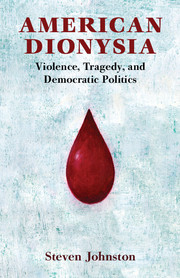Book contents
- Frontmatter
- Contents
- Acknowledgments
- Introduction: There Will Be Blood: Antinomies of Democracy
- 1 American Dionysia
- 2 Democracy at War with Itself: Citizens
- 3 Democracy at War with Itself: Animals
- 4 Forcing Democracy to Be Free: Rousseau to Springsteen
- 5 Two Cheers for Democratic Violence
- 6 New Tragic Democratic Traditions
- Conclusion: Democracy's Tragic Affirmations
- Notes
- Bibliography
- Index
4 - Forcing Democracy to Be Free: Rousseau to Springsteen
Published online by Cambridge University Press: 05 May 2015
- Frontmatter
- Contents
- Acknowledgments
- Introduction: There Will Be Blood: Antinomies of Democracy
- 1 American Dionysia
- 2 Democracy at War with Itself: Citizens
- 3 Democracy at War with Itself: Animals
- 4 Forcing Democracy to Be Free: Rousseau to Springsteen
- 5 Two Cheers for Democratic Violence
- 6 New Tragic Democratic Traditions
- Conclusion: Democracy's Tragic Affirmations
- Notes
- Bibliography
- Index
Summary
After a great victory. – What is best about a great victory is that it liberates the victor from the fear of defeat. “Why not be defeated some time, too?” he says to himself; “Now I am rich enough for that.”
Friedrich Nietzsche, The Gay ScienceNot to perpetuate cowardice against one's own acts! Not to leave them in the lurch afterward. The bite of conscience is indecent.
Friedrich Nietzsche, Twilight of the IdolsThanks to democracy, sacrifice enjoys an esteemed place in the history of democratic political thought. The same cannot be said of violence, however, despite its connection to sacrifice and indispensability to democracy. Richard Rorty, John Schaar, Charles Taylor, Benjamin Barber, and other contemporary political theorists insist that patriotism (and thus sacrifice) is crucial to a democratic community, but they make no claims on behalf of violence. Laden with much-needed affect, patriotism furnishes citizens with the loyalty, commitment, devotion, and sense of common enterprise on which democracy depends. It enables them, in short, to sacrifice – themselves, others, fundamental principles, whatever democracy requires. To maintain that patriotism (and thus sacrifice) is essential to democracy, then, is effectively to admit that violence is essential to democracy.
Democracies, as a rule, do not embrace or advocate violence. Opposition, dissent, disobedience, and resistance find their celebrants, but nonviolence is the norm that governs these practices. Many thinkers on the democratic left consider these elemental forms of political participation patriotic, rejecting violence in the process. The latter is deemed gratuitous and indefensible – except under rare circumstances. Democracy, all things considered, represents a better way of political life. From a tragic perspective, this impeccable political vision seems, well, a little too pristine. Put differently, democracy cannot think of itself in terms of violence, more specifically, the violence it enacts every day. To do so would be to welcome, so to speak, the fundamental forbidden into the social and political order. Nevertheless, democracy has a violence problem that can be traced to its beginnings.
- Type
- Chapter
- Information
- American DionysiaViolence, Tragedy, and Democratic Politics, pp. 118 - 148Publisher: Cambridge University PressPrint publication year: 2015



